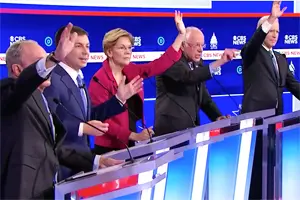CBS News botched its Democratic debate by making itself the spotlight, rather than the candidates
-

The biggest loser of the "train wreck" 10th Democratic primary debate in Charleston, South Carolina was CBS News. Members of the media, pundts and politcians of all stripes agreed that CBS News moderators Gayle King and Norah O'Donnell -- along with Margaret Brennan, Major Garrett and Bill Whitaker -- handled the debate poorly. "Some of the blame for CBS News’s chaotic, messy Democratic Party primary debate Tuesday night can be laid at the feet of the party itself — to a degree, CBS was depicting the chaos and mess of a party badly divided in the midst of a bruising campaign," says Daniel D'Addario. "But a share of ignominy also goes to CBS itself, which botched its time in the spotlight in part by insisting that it, and not the candidates, deserved that spotlight. In enlisting five of its journalists ... CBS edged close to the seven candidates onstage. The ratio suggests a bit of confusion as to which side of the dais is the evening’s main event, and while the impulse to promote the newsgathering prowess of CBS’s organization is understandable, a more limited moderating team might have worked to provide clarity to the never-more-fractious team of enemies on the stage. The moderators, tag-teaming at random, seemed to lack authority over a group of candidates who badly needed it, and their reassertions read as sour and ineffectual." D'Addario adds: "The frequent spectacle of four or more candidates with their hands raised, waiting to respond to a point, only to be told the debate was moving on, was striking, and the moderators’ passive-aggressive performance of aggrievement that the candidates wouldn’t play by the tune they set. The debate the candidates wanted to have, one more about philosophies of governance than in halting the proceedings to recite mottoes in the time King would allow before trampling the answer, was vastly more interesting than the one CBS viewers got."
ALSO:
- Candidates gleefully steamrolled the moderators: "Did you ever have a substitute teacher who was so mild-mannered, and commanded so little natural respect and authority, that you and the rest of your middle school class quickly realized you could just outshout him until he agreed to just crawl behind his desk and read a book while you did whatever you wanted for 45 minutes?" says Dylan Matthews. "That’s basically what Tuesday night’s debate felt like, except for two full hours. The candidates were so eager to get at each others’ throats (or to admonish each other for undermining party unity) that they gleefully steamrolled moderators Norah O’Donnell, Gayle King, Margaret Brennan, Major Garrett, and Bill Whitaker at every opportunity. They even took active pleasure in doing so — 'I know how you cut me off all the time but I’m not going to be quiet anymore!' Joe Biden exclaimed at one point. At another, he burst in, 'I’m not out of time. You spoke overtime and I’m going to talk!'"
- It took 83 minutes for debate moderators to ask about coronavirus: "Among the topics covered before then: a municipal ban on big sodas, the future of the filibuster, and the Naked Cowboy who performs for tourists in Times Square, a reference that may have flown over the heads of viewers west of the Hudson River," says Michael M. Grynbaum. "When Michael R. Bloomberg, the former New York City mayor, finally broached the issue of the virus pandemic during an unrelated answer, one of the moderators, the anchor Gayle King, cut him off."
- The debate was a wasted opportunity for a party and candidates who don't have time to waste: "The evening was defined by peevish exchanges, raised voices, feeble attempts at humor, complaints about fairness in being allowed to speak, and extended passages of cross-talk in which moderators utterly lost control of the debate and it was impossible even to understand what was being said," says John F. Harris. "The noise was hardly conducive to a sustained or intelligible argument about whether (Bernie) Sanders is the strongest nominee or the one most representative of the views and temper of the party. The evening offered limited opportunities—were these possibly enough?—for six Democrats not named Sanders to revive their candidacies with last-stand moments to emerge as the main alternative to the self-described democratic socialist for the balance of the nomination contest."
- How did Michael Bloomberg, who isn't running in South Carolina, have such a vocal rooting section in Charleston?: During the debate a local Charleston news report from earlier this month that the only “guaranteed” way to get a ticket was to purchase a sponsorship ranging from $1,750 to $3,200.
- Stephen Colbert booed on The Late Show for a Michael Bloomberg debate joke
TOPICS: CBS News, CBS, Amy Klobuchar, Bernie Sanders, Bill Whitaker, Elizabeth Warren, Gayle King, Joe Biden, Major Garrett, Margaret Brennan, Michael Bloomberg, Norah O'Donnell, Pete Buttigieg, Tom Steyer, 2020 Presidential Election
More CBS News on Primetimer:- “Why is CBS news constantly posting about Erika Kirk?”: Network under Bari Weiss hosting Charlie Kirk’s widow in Town Hall sparks outrage online
- “He is the PRESIDENT”: 60 Minutes' Norah O’Donnell's “Mr Trump” reference triggers backlash
- Was Bari Weiss rejected as 'The View' co-host? Everything to know as John Oliver warns about the newly appointed editor-in-chief of CBS News
- How long were Katie Porter and Matthew Hoffman married? Ex-Congresswoman was once accused of dumping hot mashed potatoes on ex-husband's head
